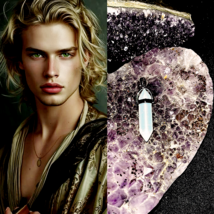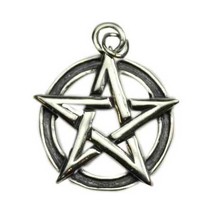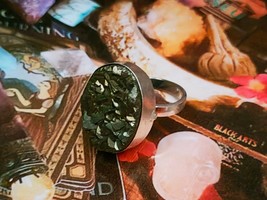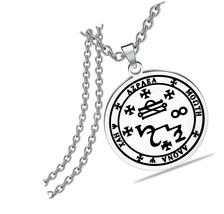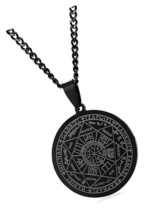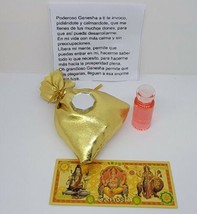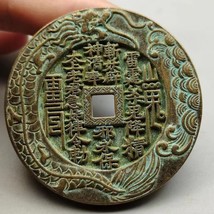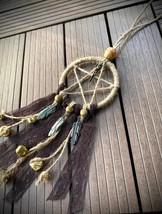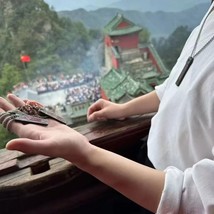Penca Of Balangandan Silver Pendant Africa and 50 similar items
Penca Of Balangandan Silver Pendant Africa Brazil Miniature Amulet Good Fortune
$148.49
View full item details »
Shipping options
Offer policy
OBO - Seller accepts offers on this item.
Details
Return policy
None: All purchases final
Purchase protection
Payment options
PayPal accepted
PayPal Credit accepted
Venmo accepted
PayPal, MasterCard, Visa, Discover, and American Express accepted
Maestro accepted
Amazon Pay accepted
Nuvei accepted
View full item details »
Shipping options
Offer policy
OBO - Seller accepts offers on this item.
Details
Return policy
None: All purchases final
Purchase protection
Payment options
PayPal accepted
PayPal Credit accepted
Venmo accepted
PayPal, MasterCard, Visa, Discover, and American Express accepted
Maestro accepted
Amazon Pay accepted
Nuvei accepted
Item traits
| Category: | |
|---|---|
| Quantity Available: |
Only one in stock, order soon |
| Condition: |
Used |
| Material: |
Silver |
| Country/Region of Manufacture: |
Brazil |
| Handmade: |
Yes |
| Religion: |
Wicca & Paganism |
Listing details
| Shipping discount: |
Shipping weights of all items added together for savings. |
|---|---|
| Price discount: |
10% off w/ $200.00 spent |
| Posted for sale: |
April 16 |
| Item number: |
1740143873 |
Item description
Measures about 1 3/4 inches high by 1 1/2 inches wide.
Some amulets are universal while others are deeply personal. The Afro-Brazilian amulet known as the
penca de balangandan is a combination of the two. Penca means ?bouquet? in Portuguese, and
balangandan (or balanganda) is an onomatopoetic word that evokes the sound of the metal charms and baubles that hang from the central fastener. Pencas were worn by Black women and women of mixed race, many of whom were enslaved. Like many artifacts
of slavery, the penca de balangandan has many layers of meaning that are contradictory and difficult to unpack.
The Museum of Ethnography explains the origins of the amulet and its meaning:
?Consisting of a number of charms strung on a common fastener hung from a chain, the balangandan traces its roots back to the 17th century, though its more general use
dates to the 18th-19th centuries. Worn by women of African descent, the balangandan most frequently adorned the thick chain belts that hung about slaves' waists, though on special occasions, it might be attached to the wrist. When not in use, it hung in
the house near the door. Originally made of silver, the balangandan represented a significant monetary value and was not infrequently presented by plantation owners to favoured slaves. Each balangandan was unique, having been composed to reflect the specific
life path of its wearer. Its charms included religious symbols that could be interpreted simultaneously as Christian in origin, or as representing certain African gods. Other charms were intended to impart good fortune, happiness, prosperity, or good health,
while a third type were selected out of gratitude for - and in commemoration of - having survived some misfortune, such as an accident or illness. The function of the balangandan was in some respects similar to that of a modern charm bracelet.?
Early pencas were typically made of silver and served as a testament to the wearer?s wealth. Pencas continued to be worn after slavery was abolished in Brazil in the 19th
century, suggesting that the power of these amulets ? and the status they imparted ? had transcended their dark origins.
Later pencas (made in the 20th century) typically consist of brass or copper and were made as art pieces and talismans rather than items of conspicuous consumption.
According to the The Museum of Ethnography, the charms themselves can be placed into 4 general categories:
Devotional, having to do with Catholic symbols and faith
Votive, individual ex-votos, as thanks for healing an
injury or illness
Propitiatory, asking for luck, happiness, money, such
charms as the clenched hand, sometimes with a cross on the forefinger
Evocative, to recall a happy event or to symbolize plenty.
The fastener itself was also said to symbolize the ships that carried enslaved people to the New World, with the birds on either side representing Africa and the Americas.
Below is a collection of charms and their meanings collected from research by the British Museum and Museum of Ethnography. Given the deeply personal nature of this charms,
the particular meaning likely varied from individual to individual, but the general symbolism is as follows:
Fist (i.e. the figa): traditionally made of wood or stone; believed to drive away illnesses and envy.
Melon: symbol of longevity.
Dove: symbolizing both the holy spirit, all the Christian martyrs and Iroco, African spirit protector of nature (whose worship is infused with mysteries)
Pomegranate: symbol of fertility.
Moon, bow and arrow: symbols of Oxossi ? the hunting God, the protector of the forests, and of Saint George.
Axe: symbol of Xango - God of lightning, fire and justice.
Tambourine: represents courage, refers back to Ogum, god of war, master of forging metals
Fish: symbol of Iemanja - Goddess of the sea waters.
Coins: symbols of wealth and prosperity
Key: symbol of freedom
Sea turtle: symbol of fertility.
Chimney sweep: symbol of good luck (introduced to Brazil in the early 19th century by German immigrants)
Key: indispensable for "closing the body" to any invading evil spirits
Star: five point star is considered a potent protector against evil
Grapes: relief from the sorrows of life, celebrations, the Portuguese wine festivals, plentiful harvests
Dog: St. Lazarus or the spirit Omulu
Hatchet: one of the symbols of Ogum, holding powerful protection
Cashew fruit with attached nut: symbol of plenty
Drum; representing omnipresent Afro-Brazilian rituals.
|
Why are we showing these items?
Search Results
Category "Amulets, Pendants & Charms"
Country/Region of Manufacture
Country/Region of Manufacture
Handmade
Handmade
|

-
Refine your browsing experience
We can show you more items that are exactly like the original item, or we can show you items that are similar in spirit. By default we show you a mix.
This item has been added to your cart
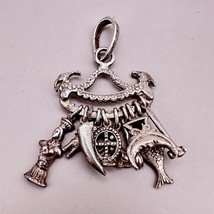 Penca Of Balangandan Silver Pendant Africa Brazil Miniature Amulet Good Fortune added to cart.
Only one available in stock
Penca Of Balangandan Silver Pendant Africa Brazil Miniature Amulet Good Fortune added to cart.
Only one available in stock
View Cart or continue shopping.
 Please wait while we finish adding this item to your cart.
Please wait while we finish adding this item to your cart.
Get an item reminder
We'll email you a link to your item now and follow up with a single reminder (if you'd like one). That's it! No spam, no hassle.
Already have an account?
Log in and add this item to your wish list.














